
-
 Eagle chip helps Gerard grabs PGA Championship lead with 66
Eagle chip helps Gerard grabs PGA Championship lead with 66
-
England great Anderson set for Lancashire return

-
 Sinner sends message by demolishing Ruud to reach Italian Open semis
Sinner sends message by demolishing Ruud to reach Italian Open semis
-
Rubio says no high expectations for Ukraine-Russia talks in Turkey
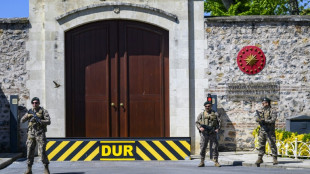
-
 NFL owners to vote on allowing players at 2028 Olympics
NFL owners to vote on allowing players at 2028 Olympics
-
Sinner demolishes Ruud to reach Italian Open semi-finals

-
 Rashford to miss final two games of Aston Villa's season
Rashford to miss final two games of Aston Villa's season
-
70 South African white rhinos to be relocated to Rwanda

-
 West Indies issue LA 2028 Olympic cricket plea
West Indies issue LA 2028 Olympic cricket plea
-
Gaza strikes kill over 100 as Hamas says aid entry 'minimum requirement' for talks
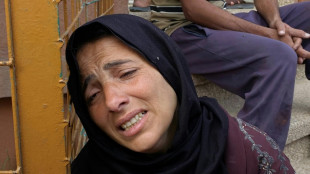
-
 Nantes striker Mohamed fined for sitting out game marking anti-homophobia campaign
Nantes striker Mohamed fined for sitting out game marking anti-homophobia campaign
-
Hamilton admits he underestimated Ferrari challenge

-
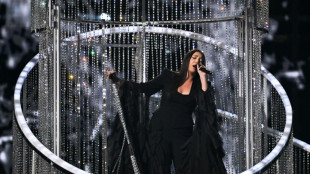 Israel in Eurovision spotlight at second semi-final
Israel in Eurovision spotlight at second semi-final
-
England's Donald shares PGA Championship lead with 67

-
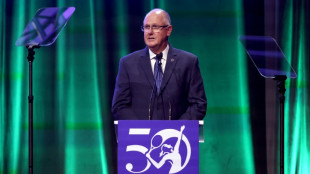 WTA president Simon to step down in December
WTA president Simon to step down in December
-
Antonelli draws on Hamilton's heart-warming message for inspiration

-
 South African rugby mourns death of Cornal Hendricks at 37
South African rugby mourns death of Cornal Hendricks at 37
-
Cool Piastri plays down prospects of more McLaren domination

-
 Hadid sister helps launch Palestinian film streaming site
Hadid sister helps launch Palestinian film streaming site
-
Groves wins neutralised Giro sixth stage, former winner Hindley abandons

-
 Knight eager to be 'one of the girls' under new England captain Sciver-Brunt
Knight eager to be 'one of the girls' under new England captain Sciver-Brunt
-
Ukraine sends team for Russia talks, downplays expectations

-
 Paolini delights home crowd by reaching 'dream' Italian Open final
Paolini delights home crowd by reaching 'dream' Italian Open final
-
Guyana says soldiers attacked in disputed border region with Venezuela

-
 Paolini delights home crowd by reaching Italian Open final
Paolini delights home crowd by reaching Italian Open final
-
Combs's ex Cassie faces intense cross-examination

-
 US set to lose $12.5 bn in foreign tourism in 2025: industry
US set to lose $12.5 bn in foreign tourism in 2025: industry
-
Ex-Olympic swim champion Agnel to go on trial over rape allegations

-
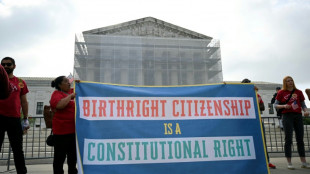 US Supreme Court weighs judicial checks on Trump with birthright case
US Supreme Court weighs judicial checks on Trump with birthright case
-
English trio among early contenders at PGA Championship

-
 US retail sales little changed, signs of pullback after pre-tariff rush
US retail sales little changed, signs of pullback after pre-tariff rush
-
NATO on track to strike spending deal to please Trump

-
 Slovenia probes disappearance of latest Melania Trump statue
Slovenia probes disappearance of latest Melania Trump statue
-
Amorim urges Man Utd to focus on Chelsea, not Europa League final

-
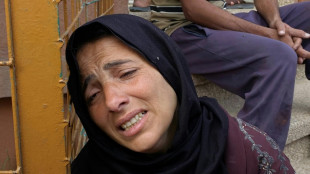 Gaza air strikes kill over 100 as manhunt unfolds in West Bank
Gaza air strikes kill over 100 as manhunt unfolds in West Bank
-
US Fed chair warns of potential for 'more persistent' supply shocks
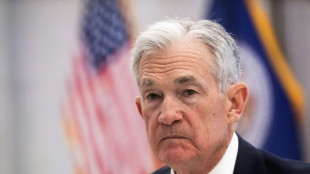
-
 Walmart warns of higher prices due to tariffs
Walmart warns of higher prices due to tariffs
-
Paul reaches Italian Open semis ahead of Sinner's clash with Ruud

-
 New Cannes Festival policy bans actor accused of rape
New Cannes Festival policy bans actor accused of rape
-
Tottenham's Kulusevski out for the season as Son steps up recovery

-
 Leclerc absent as under par Ferrari face home race
Leclerc absent as under par Ferrari face home race
-
Rome businesses count their blessings with US pope
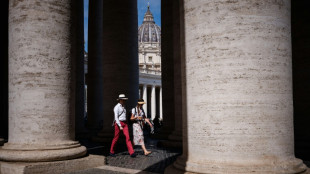
-
 World's top three launch early charge at PGA Championship
World's top three launch early charge at PGA Championship
-
Maresca 'happy' with pressure of Champions League challenge

-
 'Miracle': family reunites in Kashmir after fleeing conflict
'Miracle': family reunites in Kashmir after fleeing conflict
-
'Paradigm shift': Germany says to meet Trump's NATO spending target

-
 Struggling steel giant Thyssenkrupp's shares slump after profit hit
Struggling steel giant Thyssenkrupp's shares slump after profit hit
-
French lawmakers divided over PM child abuse hearing
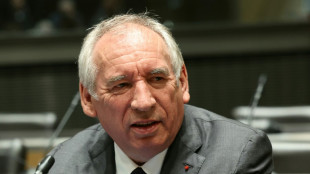
-
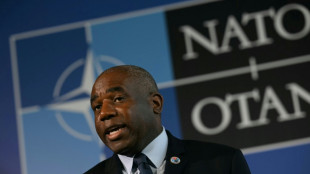 French chauffeur to face trial over alleged theft from UK minister
French chauffeur to face trial over alleged theft from UK minister
-
China's Alibaba posts annual revenue increase despite spending slump


What's next for Israel's divisive judicial reforms?
Mass protests and strikes rocked Israel this week in the face of the hard-right government's decision to push through a controversial legal reform weakening the powers of the Supreme Court.
As opponents of the legislation vow to rally again, here's a recap of the latest events and a look ahead to what comes next:
- What happened this week?
Lawmakers allied to Prime Minister Benjamin Netanyahu on Monday threw their support behind an amendment which scraps the "reasonableness" clause, used by the Supreme Court to overturn government decisions which are deemed unconstitutional.
The law passed with 64 votes in the 120-seat chamber, after opposition lawmakers stormed out shouting "shame".
The measure was a key part of Netanyahu's broader judicial reform package, which the government argues is necessary to rebalance powers between elected officials and the Supreme Court.
Critics have taken issue with the draft legislation for months, fearing it could pave the way to a more authoritarian government without judicial oversight.
They also accuse Netanyahu, who is on trial for corruption charges he denies, of trying to use the reforms to quash possible judgements against him.
He rejects the accusation.
- What new powers does it give?
Netanyahu's coalition has a parliamentary majority, meaning it does not need opposition support to pass legislation.
As Israel does not have an upper house of parliament, the "reasonableness" law was put in place to allow judges to determine whether a government had overreached its powers.
"The decision to overturn (the law) is seriously extreme, because the government or a minister can now appoint who they want without checks," said Claude Klein, emeritus professor at the law department of Jerusalem's Hebrew University.
"It gives unlimited powers to a government."
- How was the law used?
The "reasonableness" law has only been used a handful of times against government decisions.
It is a tool used "only when decisions are extremely unreasonable", according to Suzie Navot, a constitutional law professor at the Israel Democracy Institute think tank.
"If they (government) take a decision that is corrupted, then the court will intervene."
The measure was used recently in a high-profile ruling which barred a Netanyahu ally, Aryeh Deri, from serving in the cabinet because of a previous tax evasion conviction.
- Can the vote be challenged?
There have already been numerous petitions filed with the Supreme Court against Monday's legislation, including by the Israel Bar Association.
Navot says it is possible the country's highest court will strike down the legislation which has been classified as a Basic Law -- forming part of the country's quasi-constitution.
"A Basic Law cannot revoke or infringe on the core values of Israel as a Jewish and democratic state," she said.
"The Knesset (parliament) is not empowered to change the essence of the country and if it does so, then the court will be able to declare even a Basic Law unconstitutional," she added.
But Supreme Court justices have never before made such a ruling.
The court on Wednesday announced it would take on the case and not freeze the legislation while legal proceedings are underway.
Hearings are set to be heard in September and are likely to be televised, giving the public a chance to see all parties present their arguments.
- What's next for the wider reforms?
With parliament entering its summer recess, the next piece of Netanyahu's legal overhaul is not expected to hit the chamber floor for months.
The premier on Monday promised talks with the opposition.
Julia Elad-Strenger, a politics lecturer at Israel's Bar-Ilan University, said this week's vote was a "big win" for the government and its overhaul plans.
"Because once the first law has passed with such protest, it will be easier to pass the next," she said.
Other items on the agenda include handing the government a greater say in the appointment of judges and downgrading the status of legal advisers attached to ministries.
"The most important part of the project is the process of nominating judges, not that which was voted on Monday," said Klein.
- Will Israel's divisions deepen?
Opposition leaders and protesters, who have taken to the streets in their tens of thousands every week since January, are sceptical of the government's sincerity in holding talks.
"This is a gesture of winners, not of losers," said Elad-Strenger.
Divisions are only expected to deepen in the coming months, as the government presses ahead with its reform package.
For Klein, the situation is no less than "the greatest legislative crisis in the history of the country."
Th.Berger--AMWN
